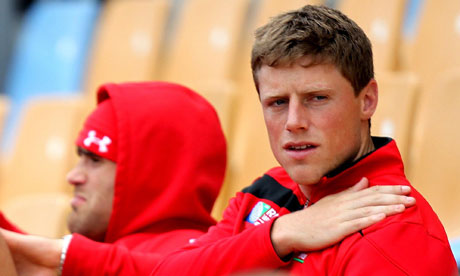
If progress is measured in statistics, Wales barely advanced in the World Cup. They finished fourth, their best return since 1987 but Warren Gatland's side lost three matches out of seven and will return home on Sunday to find themselves ranked eighth in the world, below Ireland – whom they beat in the quarter-finals – and England, who failed to make the semi-finals.
If, on the other hand, progress is measured in the intangible, Wales are in a far better place than when they arrived in New Zealand seven weeks ago. They were within a few feet of making the final, the distance by which the long-range Leigh Halfpenny penalty, four minutes from the end of the semi-final against France, fell short. A puff of wind would have taken the kick over, such was the thin margin between elation and despair. A semi-final might have been seen as beyond Wales's expectation when they started their campaign against the holders, South Africa, on a wet and windy night in Wellington last month, but such was the bold assurance with which they played, a fusion of ingenuousness and knowhow, that they were immediately tagged as a team with the potential to make it to the final.
Wales return home knowing they should have been playing New Zealand on Sunday rather than battling jet-lag, despite having their captain, Sam Warburton, sent off 17 minutes into the match against France and losing the influential prop, Adam Jones, to injury. Warburton had defined their campaign; a clean-cut 23-year-old, who stood taller than anyone else on the field and was an ambassador for his country off it. But the player they missed most in the semi-final and in Friday's play-off against Australia was an outside-half who, at the beginning of August, looked for no more than a bit-part role in the World Cup. Rhys Priestland only started at outside-half in Wales's first pre-World Cup friendly that month, against England at Twickenham, because Stephen Jones had strained a calf muscle in the warm-up. It turned out to be a happy accident for the coach Gatland that was repeated when Matthew Rees was ruled out of the tour with a neck injury and was replaced, as captain, by Warburton.
Priestland, in his understated way, transformed the way Wales played and it was notable that, in his absence against France and Australia, they reverted to attacking down narrow channels, unable to achieve the width that had helped them to reach the last four. Priestland brought his back three into the game and his instant decision-making gave the centre, Jamie Roberts, the extra half-second he needed to get into his stride and break challenges. Without him, Wales became lateral, cramped and predictable.
"People criticised Rhys's selection, but they must have been watching a different game to me," said the Wales defence coach, Shaun Edwards. "I was flabbergasted by that and he has proved to be an inspired choice by Warren. The best days of this team lie ahead of it."
A number of players, such as Priestland, will return to regions where they are not automatic starters. Just as their grand slams in 2005 and 2008 proved top-end successes, not based on a foundation laid below, so Wales reached the semi-final because of the endeavours of their management team more than the four regions that underpinned the national set-up. "We will go away from this with a feeling that we can compete with the best in world rugby," said Roberts. "That is a strong mindset to take into the next couple of years. If we get things right, we will put away teams like the ones we lost to in the World Cup."
Wales have been here before, the glow of a brighter future proving hallucinatory. The Welsh Rugby Union intends to hold Gatland to his four-year contract should his native New Zealand come calling in search of Graham Henry's successor, but it needs to address failings in the domestic game: to better distribute funding that has been compromised by cramming more and more internationals into the calendar, and ensure that success is built from the bottom up and becomes sustainable.

